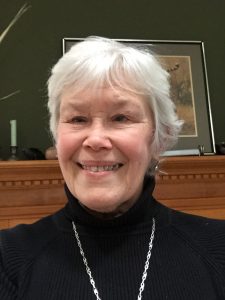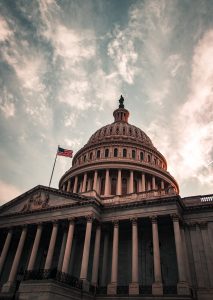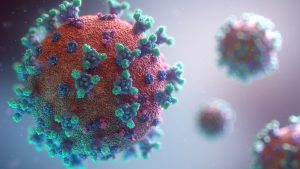Individual and Societal Priorities via COVID-19: Guest writing by Mary Tom Watts
Photo by Fusion Medical Animation on Unsplash
“There isn’t time, so brief is life, for bickerings, apologies, heartburnings, callings to account. There is only time for loving, and but an instant, so to speak, for that.” Mark Twain
In the 300 words I asked her for, my friend Mary Tom Watts—who writes for newspapers, reflects theologically on the sacred and secular, and was a writer for ‘The Gary Burbank Show’—offers us a model for thinking about our post-Covid 19 world:
1. Practice the humility to examine the things we’ve prioritized and admit that some may not have been worthwhile.
2. Find the courage to change and to accept that the choices we then make might not be right.

Mary Tom Watts
“Existential dis-ease is part and parcel of the pathogen the world is up against, and social isolation is ready-made for self-examination and re-set.
For a lot of us, intentional reflection started with what’s for dinner, when the pantry started running low, and how we would make do, so to speak, when the toilet paper runs out.
As the days of stay-at-home compliance wear on—my eighth week, at this writing—I’m taking stock of things beyond fresh produce and paper products.
There are aspects of the way I’ve spent my time since mid-March that I like a whole lot, and I’ve begun to consider the adjustments I can make, when restrictions are lifted, so that I can have more of what I’ve come to value.
Here’s where humility and courage come in. It requires a good dose of humility to consider that some of my previous activities, affiliations, and priorities may not have been worth the commitment I made to them.
I will need courage to change course when the pandemic restrictions are over. My approach will be to weigh the personal and collective cost of ending previous collaborations and contributions. And in those instances when I decide to bow out, I expect to experience, to one degree or another, ambiguity about whether I made the right call.
Basically, it boils down to asking the same questions I’ve wrestled with when I’ve moved to a new house: What do I keep? What do I discard? What will I need to acquire?
***
NOTE: Not all transitions in our lives and culture are as easily identifiable as the period we’re currently living in. The William Bridges Transition Model is a resource I have found immensely beneficial in times of personal and organizational transition. It can be found at wmbridges.com .”
Brief Bio: Mary Thomas Watts is a veteran journalist, radio comedy writer, and adult theological educator. She lives and writes in Wilmington, Ohio, and treasures her longtime writers’ group, which includes Greta Holt.
______________________________________
My Response to Mary Tom
That’s a tall order, Mary Tom. To adapt the challenge, I’ve done a bit of searching beyond the individual. Perhaps I’m reaching out to the world’s need to change because my own self reflection is often too confusing and painful. Courage and humility? Like most egotists, I’m still stumbling one minute and striking at windmills the next. Your daring to assess what you have come to value is key to society’s evolution.
At times, even when I’m writing an occasional speech for church, I find real wisdom in listening to Business People. What?—certainly not all business folk, but those who think outside the Trickle Down box. This month, I’ve found inspiration in the talks of Nick Hanauer, a wealthy one percenter, who has championed raising the minimum wage to $15. Hanauer’s background is important: before becoming an entrepreneur, he earned a philosophy degree from the University of Washington. Studying something other than money and business can give one perspective, and he has it.
A confirmed capitalist, Hanauer and his colleagues are working to change the innards of capitalism, not to destroy it. Imagine a post-Covid world with these understandings:
1. Capitalism is like a garden. It must be tended and constrained.
Today, I worked for two hours in my flower beds moving perennials to better spots, weeding, and planting moss in the wet areas. Sadly, but with determination, I put out my mole traps. I respect my garden but I work to control it.
2. The rich have not worked harder than the working poor. Period. At least that is my interpretation of Hanauer’s words. Think about the documentaries you’ve seen concerning the daily lives of the poor. Being poor is exhausting.
3. Trickle down economics exist in the realm of myth, the trickle simply does not move down. A strong middle class is the fuel of capitalism. Capitalism does not require a hypodermic injection of greed. Greed is sociopathic. Science is beginning to define humans as cooperative, not competitive. It isn’t capital that creates economic growth, it’s people. Not competition, but cooperation. We need social cooperation to thrive.
4. Currently, new economics are being defined, based on science. Prosperity comes from increased innovation and increased consumer demand. In the modern world, this requires more complexity and cooperation: teamwork rather than competition.
Until businesses switch to understanding that the purpose of the corporation is not for the shareholders but to improve all stakeholders, corporations will not be truly capitalistic, they will continue to be anti-societal.
_______________________________________
My husband Tim is a prodigious reader, who awaits his next echocardiogram and stamp of heart health later this month. A prayer would be welcomed.
We sat on the back porch yesterday and discussed the world, as couples who like each other are wont to do. Many of you do exactly the same.
Here are a few things we discussed about life after COVID-19:
Capitalism and Socialism are not religions. They are economic structures that ought to help societies thrive, no matter their varying demands of taxation and services.

Photo by Kyle Mills on Unsplash
With social distancing’s clearing skies and falling ozone counts, governments must take a hard look at what people are actually doing and buying. People aren’t driving and planes aren’t flying, and there is too much oil with no place to store it. Energy companies might get rid of fracking and oil drilling off the coast (might.) I myself paid 60 cents per gallon for gas this week, using my Kroger card.
In business, though, it is cost, rather than the environment that will run this interest.
Going by a recent Exxon advertisement, one can see that the big companies are developing windmills and solar panels. So, sadly but realistically, it may not be primarily new, eager companies that will innovate. Where the money already is, is where the development of new energies will be able to happen first.
Government should help more with energy costs. But wouldn’t it be wonderful if energy was a right, rather than an ability to afford, or if our taxes actually went to providing energy for all?
Public education may still mirror the inequities in our wages. It will rely more upon online learning but require a government response ($$) to provide all kids with computers/tablets. Will people vote for levies, sports and band programs? No ones knows. What a mess. Our hearts go out to everyone who is working in education.
I read one of the NYT opinion columnists who said that deforestation (that pesky environment again) has forced primates, rats, and bats to inhabit people territories and bring viruses with them. Do we really need this much meat and ridiculously large homes?
Umm, the health business, anyone? Bernie, Elizabeth? Is health care a human right? How much are we willing to pay so that all may have proper care? God bless our nurses and all health workers.

Photo by National Cancer Institute on Unsplash
Tim hopes there may be enormous support on both sides of the political aisle for never getting caught in this situation again. ??? My husband is a very positive guy. He can walk and chew gum at the same time, meaning, balance the realities of despair and joy and keep moving forward.
Tim reminds me that the mundane things we can do in our isolation bubbles are precious: writing to friends or Zooming, washing dishes and cleaning the house, learning new things and playing Scrabble. And being kind to those in our atmosphere, and forgiving ourselves for imperfection.
___________________________________________________
Mary Tom has led us to examine our individual priorities and responsibilities, an essential discipline during this world-wide wake up call. It is in our homes that change begins. She leads us to ponder, What do I keep? What do I discard? What will I need to acquire?
Societies and structures must re-prioritize in a post-Covid 19 world or we may not make it. We will either kill each other as resources become scarce and immigration overwhelming, be killed by further pandemics, or simply force Mother Nature to give up on us. What courage it will take to come together for the common good! How difficult it will be to know which decisions will bear fruit for God’s Kingdom. Perhaps we should listen to God’s voice, not just our own voices.
Most of us can agree, though, that we’re surely not happy with the folks who refuse to wear face masks at the hardware store.

Photo by Ryan Franco on Unsplash
___________________________________________
I welcome your comments: gretaholtwriter.com/blog.
Best wishes and have a good week.
Greta

Greta! What a moving, thought-provoking post! Unfortunately, it takes a crisis to get us humans to change–or even consider the prospect. COVID-19, with all the destruction and heartache it is leaving in its surge, is providing us with some challenging but wonderful opportunities to look hard at many unhealthy, unfeeling, and ultimately unproductive, patterns of behavior we’ve kept below the surface of our consciousness (or have conveniently chosen to ignore). With that awareness–and with the impossibility of going back fully to “life as we’ve known it”–we have greater incentive to change/discard/refigure those patterns that need changing, discarding, or refiguring. Thank you, Mary Tom, and Tim for so eloquently opening up this critical conversation!
What a fine comment, as usual Diane. You are working to change the narratives of society, and we can hope that major adjustments in our human equations happen. We can hope.